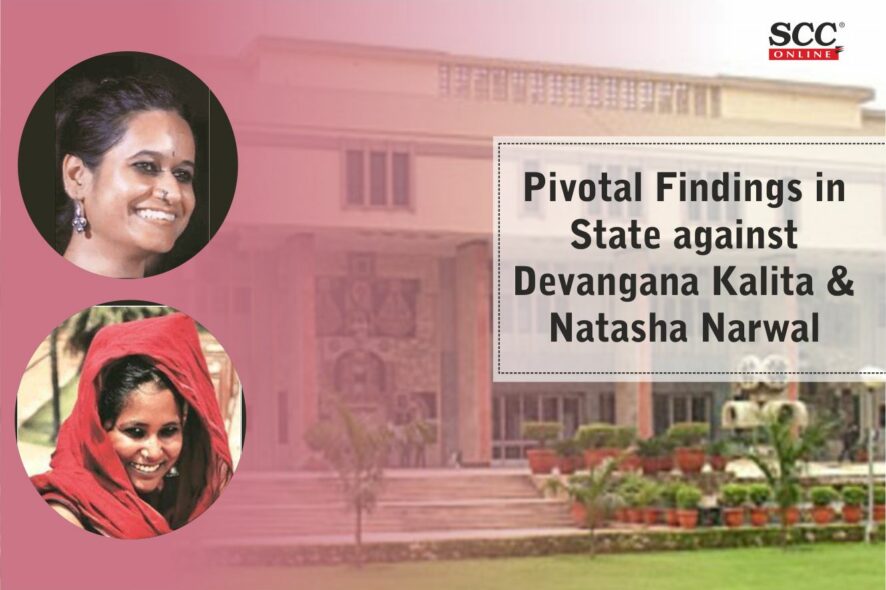Delhi High Court: The Division Bench of Siddharth Mridul and Anup Jairam Bhambhani, JJ., granted regular bail to activist Devangana Kalita and Natasha Narwal in the Delhi-Riots case.
Appellant’s who were arrested for participating in protests against the Citizenship Amendment Act, 2019 and in custody since 29-05-2020, preferred the appeal under Section 21(4) of National Investigation Agency Act, 2008 impugning order of Special Court rejecting her bail application registered under provisions of Penal Code following to the addition of provisions of Prevention of Damage to Public Property Act, 1984 and Unlawful Activities (Prevention) Act, 1967.
Why was Devangana Kalita & Natasha Narwal in custody? | State against Devangana Kalita & Natasha Narwal. Why?
Larger Conspiracy
State essentially alleged that the appellant’s as a part of women’s rights group called Pinjra Tod and other activistic groups participated in a ‘larger conspiracy’ to commit certain offences which led to violence and rioting in the North-East Delhi between 22-02-2020 and 26-02-2020.
Findings and Analysis
- Purported independent review of evidence by a purported independent authority; and the fact that the Central Government has, based thereupon, granted sanction of prosecution for offences under Chapters IV or VI of the UAPA, must never enter the consideration of the Court when deciding whether the ingredients of any offence under the UAPA are disclosed in the charge-sheet.
- In Asif Iqbal Tanha v. State of NCT of Delhi in CRL. A. No. 39/2021, Court analysed the provisions engrafting ‘terrorist act’ and ‘conspiracy’ or ‘act preparatory’ to the commission of a terrorist act.
- The phrase ‘terrorist act’ cannot be permitted to be applied in a cavalier manner to criminal acts or omissions that fall squarely within the definition of conventional offences.
- Right to Protest: Contours of legitimate protest have been explained in the Supreme Court decision of Mazdoor Kisan Shakti Sangathan v. Union of India, (2018) 17 SCC 324. In the said decision it was expressed that: “legitimate dissent is a distinguishable feature of any democracy and the question is not whether the issue raised by the protestors is right or wrong or whether it is justified or unjustified, since people have the right to express their views; and a particular cause, which in the first instance, may appear to be insignificant or irrelevant may gain momentum and acceptability when it is duly voiced and debated.”
- In the charge-sheet, Court did not find any specific or particularised allegation that would show the possible commission of a ‘terrorist act’ within the meaning of Section 15 UAPA or an act of ‘raising funds’ to commit a terrorist act under Section 17 or an act of ‘conspiracy’ or an ‘act preparatory’ to commit, a terrorist act within the meaning of Section 18 UAPA.
- Bail Principles: The said principles were in detail discussed in the decision of Asif Iqbal Tanha v. State of NCT of Delhi in CRL. A. No. 39 of 2021, a brief reiteration of the same was done in the present matter.
Devangana Kalita | Conclusion
- Right to Protest is not outlawed and cannot be termed as a ‘terrorist act’ within the meaning of UAPA, unless ingredients of offences under Sections 15,17 and 18 of the UAPA are discernible from factual allegations.
- Shorn off the superfluous verbiage, hyperbole and the stretched inferences drawn from them by the prosecuting agency, the factual allegations made against the appellant do not prima facie disclose the commission of any offence under Sections 15, 17 and/or 18 of the UAPA.
- It appeared that in its anxiety to suppress dissent and in the morbid fear that matters may get out of hand, the State has blurred the line between the constitutionally guaranteed ‘right to protest’ and ‘terrorist activity. If such blurring gains traction, democracy would be in peril.
Appellant in view of the above discussion was granted regular bail subject to conditions.[Devangana Kalita v. State, 2021 SCC OnLine Del 3255, decided on 15-06-2021]
Natasha Narwal | Conclusion
- No specific, particularised or definite act was attributed to the appellant, apart from the fact that she engaged herself in organising anti-CAA and anti-NRC protests when riots and violence broke out in certain parts of North-East Delhi.
- State cannot thwart grant bail merely by confusing issues.
- Opinion: Allegations relating to inflammatory speeches, organising of chakka jaam, instigating women to protest and to stock-pile various articles and other similar allegations, at worst were evidence that the appellant participated in organising protests, but no conclusion of a specific or particularised allegation that appellant incited violence, what to talk of committing a terrorist act or a conspiracy or act preparatory to the commission of a terrorist act as understood in the UAPA.
The Appellant was granted regular bail subject to conditions.
[Natasha Narwal v. State (NCT of Delhi), 2021 SCC OnLine Del 3254, decided on 15-06-2021]
Advocates before the Court:
For the Appellant: Mr. Adit S. Pujari, Ms. Tusharika Mattoo & Mr. Kunal Negi, Advocates.
For the Respondent: Mr. Amit Mahajan, Mr. Amit Prasad and Mr. Rajat Nair, SPPs for the State along with Mr. Dhruv Pande & Mr. Shantanu Sharma, Advocates.
Also Read:







